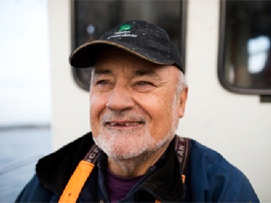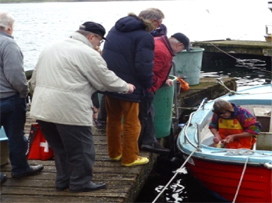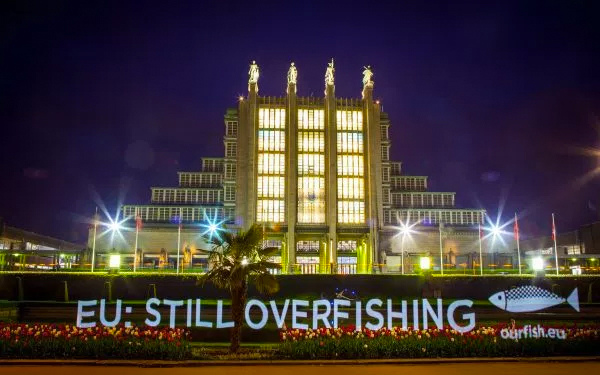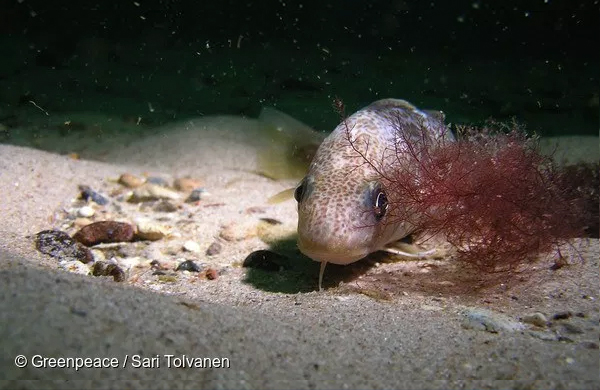Die Minister der Ostseeländer müssen handeln um einen „ Dorschkollaps“ zu verhindern.
Kopenhagen, Mittwoch den 31.Mai 2017.
Als Reaktion auf die Entwicklung des Dorschbestandes der vom internationalen Rat für Meeresforschung ( ICES ) untersucht wurde, fordert die Aktionsgruppe „Our Fish“ die Minister der Ostseeanrainerstaaten auf, dringend Maßnahmen zu ergreifen um einen Kollaps der regionalen Dorschfischerei zu verhindern.
Die Untersuchung der Fischbestände in der Ostsee zeigt, dass trotz eines starken Nachwuchsjahrganges 2016 die Dorschbestände noch immer überfischt werden,.( 1 ) Außerdem wurden laut ICES, 11 Millionen untermaßige Dorsche des östlichen Bestandes durch die Schleppnetzfischerei unbeabsichtigt gefangen -und dann aussortiert und illegal tot oder sterbend zurückgeworfen wurden. (2,3)
Um den Kollaps der Dorschbestände in der Ostsee zu verhindern und um das Aufwachsen zukünftiger Nachwuchsjahrgänge sicherzustellen, muss nicht nur den Vorschlägen des ICES in diesem Jahr gefolgt werden , sondern auch die Fischer müssen dazu gebracht werden, die Selektivität ihrer Netze zu optimieren. Unsere Leiterin der Fischkampagne REBECCA HUBBART fordert daher die zerstörerische Grundschleppnetzfischerei zu verbieten, die sowohl den Dorschbestand als auch die darauf angewiesenen Fische, in ihrer Existenz gefährden.
Der westliche Dorschbestand wurde durch intensive Befischung schon seit Jahrzehnten übernutzt und befand sich dadurch schon öfter am Rande des Zusammenbruchs. Trotz des starken Nachwuchsjahrganges 2016 befindet sich die Biomasse auf dem zweitniedrigsten Stand seit den 80er Jahren und außerhalb sicherer Reproduktionsgrenzen. (1) Our Fish ruft die Minister der Ostseeanrainerstaaten dazu auf, die Notwendigkeit einer Bestandserholung bei der Festsetzung der Fangquoten für das Jahr 2018 zu berücksichtigen und nicht über die wissenschaftlichen Empfehlungen hinauszugehen.
Die ICES Empfehlungen bilden die wissenschaftliche Basis für die Beratungen und die Festsetzungen der Fangquoten, die in der diesjährigen Sitzung der EU Kommission im Oktober stattfinden. Trotz der Verpflichtung die Gemeinsame Fischereipolitik umzusetzen und die Überfischung der Bestände zu beenden, waren und sind diese Sitzungen der EU Kommission wegen mangelnder Transparenz, mangelndem Verantwortungsbewusstsein
und der laufenden Unterlassung, die Festsetzung der Fangmengen dem geltenden Recht entsprechend vorzunehmen, zu kritisieren. (3,4) Letztes Jahr wurden die Fangquoten bei 4 von 10 Beständen wissentlich oberhalb der wissenschaftlichen Empfehlung festgesetzt. Dies führte zur Fortsetzung der Überfischung und zu einer Abnahme der wirtschaftlichen und sozioökonomischen Leistung.
Der östlich Dorschbestand war für lange Zeit eine Goldmine für die Fischerei und es wurden hohe Fänge über Jahre hinaus erzielt. Den Höchststand bildete das Jahr 1984 mit 400.000 Tonnen, gefolgt von einer danach kontinuierlich fortschreitenden Abnahme auf 57.000 Tonnen im Jahre 1992. Die Fangempfehlung für dieses Jahr betrug gerade etwas über 22.000 Tonnen-gerade den achtzehnten Teil des Höchstfanges aus 1984. (3)
In jüngster Vergangenheit haben sich Dänemark und Deutschland für eine Überfischung stark gemacht, unter Nichtbeachtung der ICES Empfehlung. (5,6) „Wenn der dänische Minister für Ernährung und Landwirtschaft ESBEN LUNDE LARSEN und der deutsche Minister für Ernährung und Landwirtschaft CHRISTIAN SCHMIDT diese sinnlose Ausplünderung nicht zuletzt auch durch die 10 % Rückwürfe in der Schleppnetzfischerei nicht umgehend verhindern, sind sie mitverantwortlich für den Niedergang der kommerziellen Fischerei auf Großkuttern, anstatt Nachhaltigkeit zu fördern und die Zukunft der kleine Küstenfischerei zu sichern“ schlussfolgert HUBBART.
Schlussfolgerungen
Die Altersstruktur des westlichen Dorschbestandes leidet unter einer zu geringen Zahl an laichreifen Fischen. (8) Der Anteil der Altersklasse zweijähriger Fische betrug im Jahre 1994 35% wohingegen die Erwartungen für 2016 bei 71 % liegen (2). Ähnlich sieht es aufgrund von langjähriger Überfischung beim östlichen Bestand aus. Große laichfähige Fische fehlen.
Die Quotenempfehlung für die kommerzielle Fischerei, auf den westlichen Bestand beträgt zwischen 1376 und 3541 Tonnen. Hier von werden 1754 Tonnen der Angelfischerei zugeordnet.
Der östliche Bestand hat sich in der letzten Zeit so stark verändert, dass brauchbare Daten fehlen. Dies verhindert vorausschauende Bestandsermittlungen und Bestandsempfehlungen und Herangehensweisen .Für diesen Bestand in Verbindung mit vorbeugenden Beurteilungen ( durch das Fehlen sicherer Daten) soll der EU Anteil, basierend auf die ICSES Empfehlung, nicht höher als 26071 Tonnen sein (3).
Quellennachweis
- ICES (2017), ICES Advice on fishing opportunities, catch, and effort, Baltic Sea Ecoregion. Published 31 May 2017. cod.27.22-24
- Limited observer data indicates that undersized cod represent more than 10% of the total eastern Baltic cod catch in tonnes (equivalent to 11 million individuals), while landings of undersized cod are very low and discarding still takes place, despite the Landing Obligation being in place since 2015.
ICES (2017). Report of the Baltic Fisheries Assessment Working Group (WGBFAS), 19-26 April, 2017, ICES HQ, Copenhagen, Denmark. ICES CM 2017/ACOM:11.
- Anecdotal evidence suggests fishers are modifying selectivity properties of their gear to increase catch rates of all cod, leading to a higher number of undersized fish being caught.
ICES (2017), ICES Advice on fishing opportunities, catch, and effort, Baltic Sea Ecoregion. Published 31 May 2017. cod.27.25-32
- https://corporateeurope.org/power-lobbies/2017/05/fishing-influence
- http://transparency.eu/project/overfishing-in-the-darkness/
- New Economics Foundation (2017), Landing the Blame – Overfishing in the Baltic 2017.
- New Economics Foundation (2016), Landing the Blame – Overfishing in the Baltic Sea 2016.
- Marteinsdottir G, &Begg G.A. 2002. Essential relationships incorporating the influence of age, size and condition on variables required for estimation of reproductive potential in Atlantic cod Gadusmorhua. Marine Ecology Progress Series, 235: 235–256.
Contacts
Dave Walsh, Communications Advisor,dave@our.fish +34 691826764
Rebecca Hubbard, Campaign Manager, rebecca@our.fish +34 657 669 425
Was ist “Our Fish”?
Our fish:
- Arbeitet daran sicherzustellen, dass die EU Mitgliedstaaten die Gemeinsame Fischereipolitik, GFP umsetzen und wirbt für nachhaltig bewirtschaftete Fischbestände in den europäischen Meeren.
- Führt Organisationen zusammen, um mit einer Stimme die Beendigung der Überfischung und Lösungen für eine nachhaltige Befischung der europäischen Meere zu fordern.
- Fordert eine ordentlich gemanagte und effektive Fischerei.
- Fordert alle Mitgliedsstaaten auf, dem Fischereiaufwand jährliche Grenzen zu setzen, die sich an nachhaltigen Kriterien ausrichten und sich auf wissenschaftliche Untersuchungen und Empfehlungen stützen. Ziel ist der Nachweis , um nachzuweisen, dass ihre Fischereiflotten durch Kontrollen und Dokumentation der Fänge, nachhaltig fischen.
http://www.ourfish.eu
Der Kommentar
Wolfgang Albrecht,

- Vorsitzender des Fischereischutzverbandes Schleswig-Holstein
Die jüngste Entwicklung in der Dorschfischerei ist kein Anlass zur Freude, sondern, wenn nicht bald durch entschlossene Maßnahmen gegengesteuert wird, eher das Ende auch von vielen Betrieben der stillen Fischerei mit passiven Fanggeräten, die den jetzigen Bestandsrückgang gar nicht verursacht haben. Drei Krisensitzungen im vergangenen Jahr haben außer finanzieller Unterstützung, vornehmlich an der falschen Stelle, nichts gebracht und waren für den nötigen Bestandsaufbau des Dorsches in der westlichen Ostsee, eher ungeeignet, weil die nötigen Maßnahmen ( Paketlösung: Überbrückungshilfen, Verringerung des Fangaufwandes bei den Verursachern) nach wie vor fehlen.
Es fehlt auf der Entscheidungsebene an Mut und Übersicht, um zielführende Maßnahmen anzuschieben.
Man befasst sich mit Vermarktungskonzepten und übersieht dabei, dass die stille Fischerei mit passiven Fanggeräten, die bekanntlich nicht in andere Fanggebiete ausweichen kann, kurz vor ihrem Ende steht. Ohne Fänge gibt es dann auch nichts zu vermarkten.
Was wird dann aus der Touristenattraktion in unseren Häfen ??

„Dunkeltuten“ !!
Auch die Behauptung: „ Die Fischer sitzen alle in einem Boot“ hilft uns nicht wirklich weiter, wenn ein Teil der Flotte durch viel zu hohen Fangdruck die Fischbestände dermaßen überbeansprucht, dass als Folge, die Quoten gegen Null gekürzt werden müssen.
Zur Ursachenbeurteilung bietet die vorstehende Pressemitteilung von „ Our Fish“ viel Interessantes zum Nachdenken.















